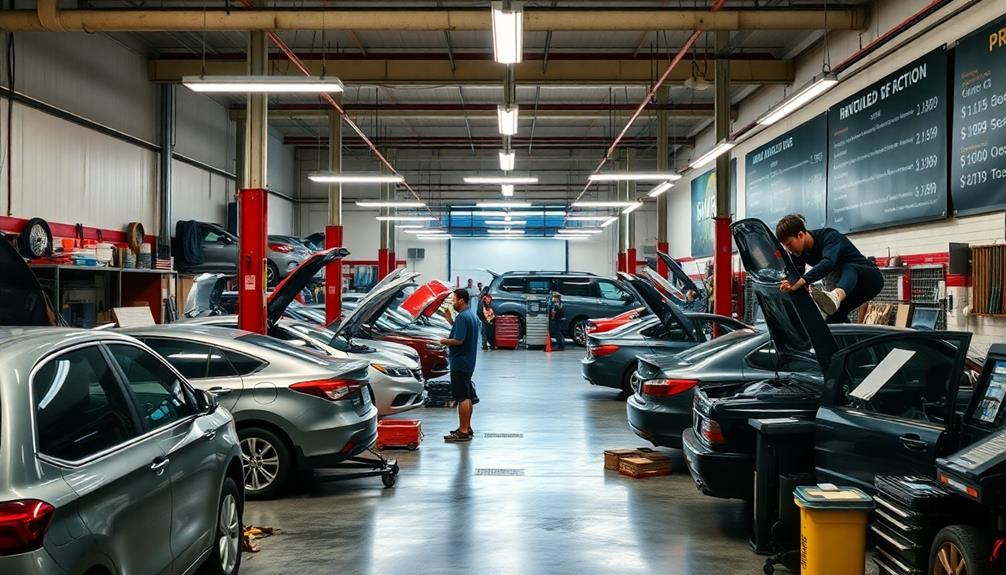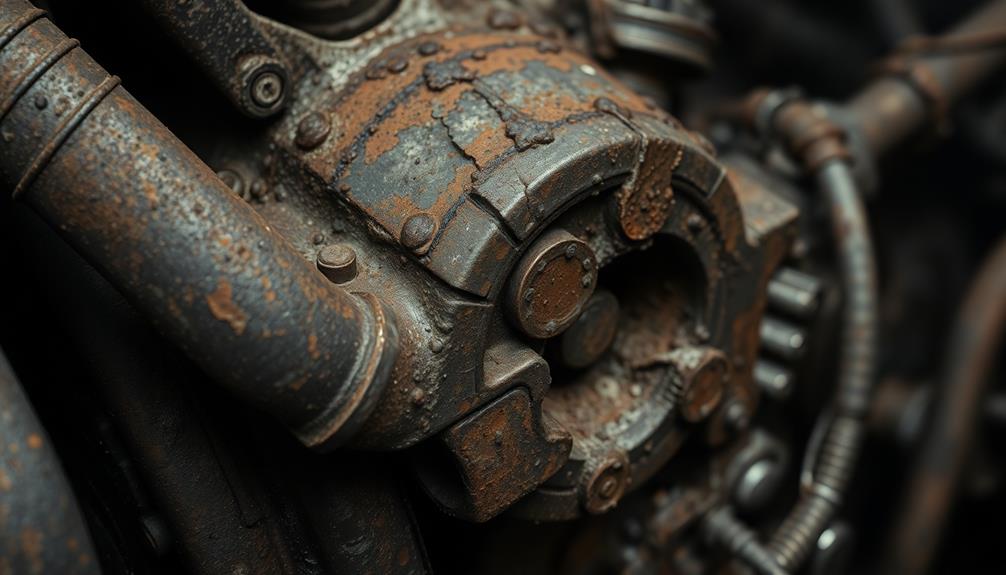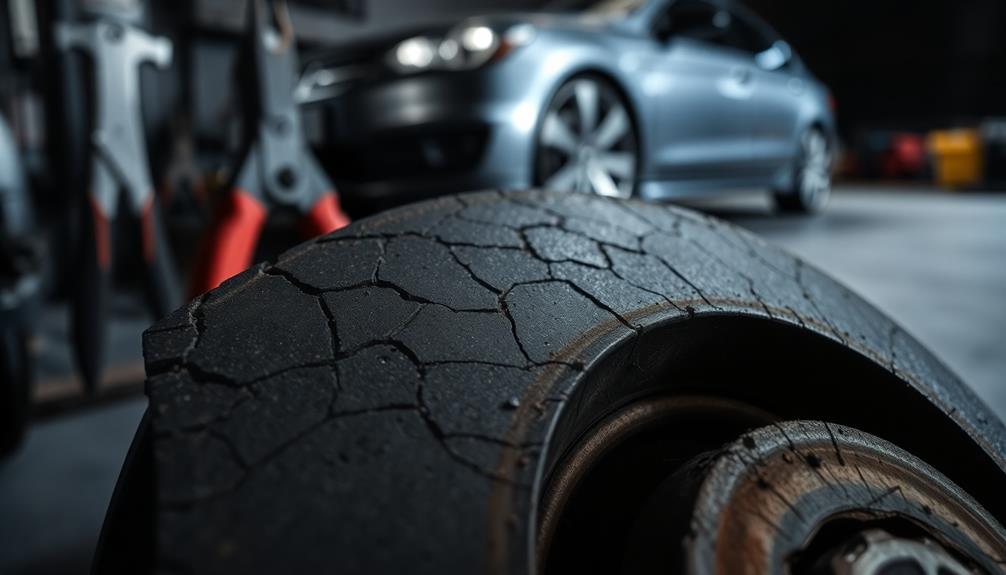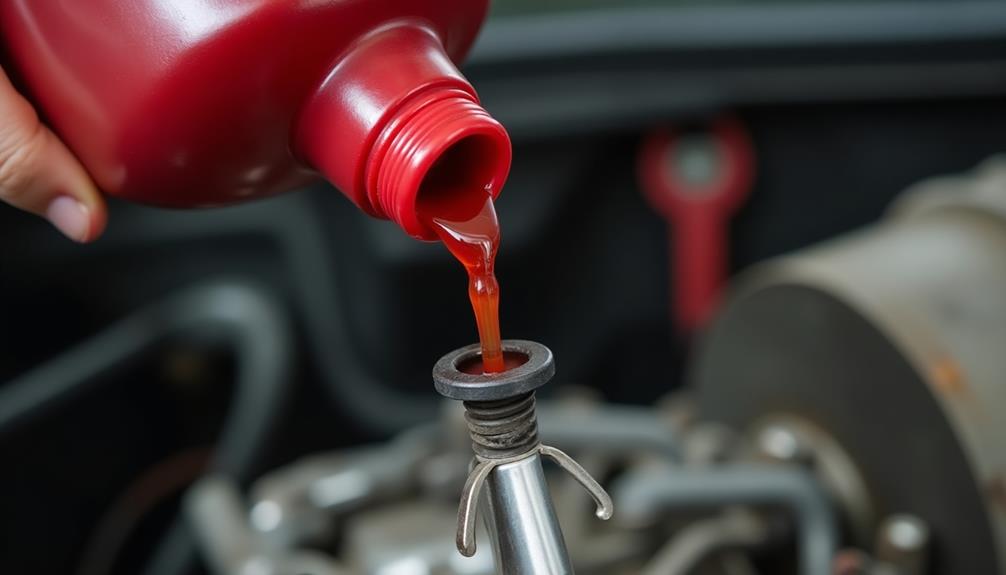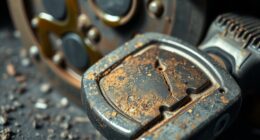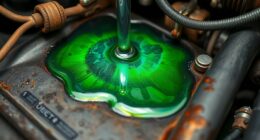If your car's making strange noises, don't ignore them—they could signal serious problems! Squealing brakes mean your pads are worn; get them checked immediately. Grinding gears often suggest transmission issues, and humming could indicate alternator trouble. Rattling under your car may come from loose exhaust parts or worn suspension, while whistling or hissing hints at vacuum leaks that impact performance. Each of these sounds requires prompt attention to prevent costly repairs. The next steps you take can save you time and money, so stick around to discover how to handle each situation effectively!
Key Takeaways
- Squealing brakes indicate worn pads; ignoring them can lead to reduced braking efficiency and safety hazards.
- Grinding gears may signal transmission issues; regular maintenance can prevent costly repairs.
- A humming engine often points to alternator problems or worn bearings; early detection is crucial.
- Rattling under the car can result from loose parts; prompt inspections help avoid significant damage.
- Whistling or hissing sounds may indicate vacuum leaks or air intake issues; regular checks enhance performance and prevent escalated problems.
Squealing Brakes
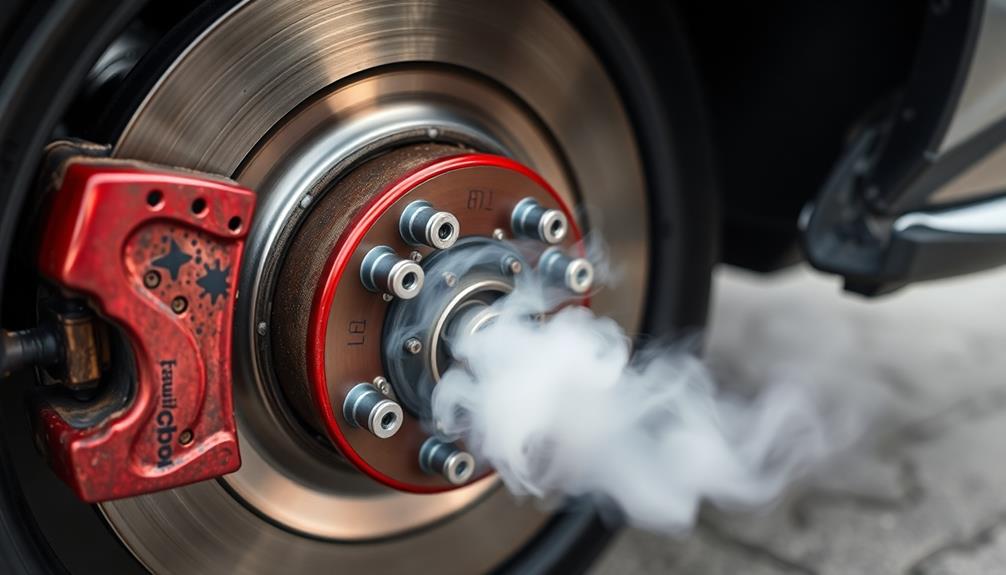
When you hear squealing brakes, it's a clear sign that your brake pads are worn down and need immediate attention. This high-pitched noise comes from wear indicators on the brake pads rubbing against the rotor, alerting you to the need for service.
Ignoring these warning sounds can lead to decreased braking efficiency and potential brake failure, posing a serious safety risk while you're driving. Regularly inspecting your brake system and addressing any issues promptly is crucial for maintaining optimal performance and ensuring your safety on the road. Additionally, it’s important to be aware that a malfunctioning brake system can sometimes be linked to a dangerous vehicle wiring problem, which could disrupt critical electronic components. Ignoring such issues increases the likelihood of accidents, underscoring the importance of professional diagnostics and timely repairs.
To avoid excessive wear on your brake system, it's essential to schedule regular inspections of your brake components. Timely replacement of worn brake pads not only improves your safety but also extends the lifespan of other parts, such as rotors.
If you wait too long, you could face more than just a simple brake pad replacement; you might end up paying for costly repairs due to damage caused by neglect.
Grinding Gears
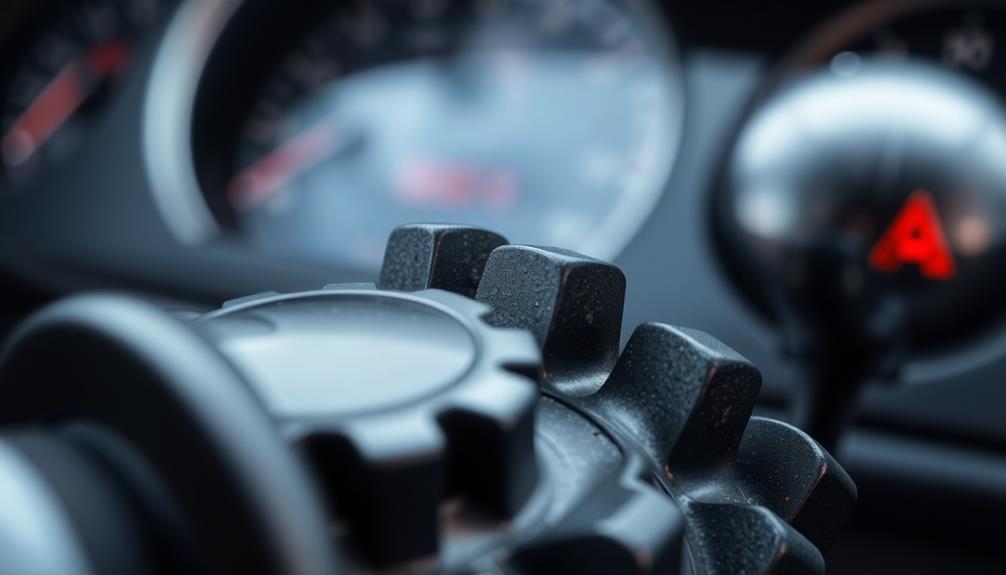
Squealing brakes aren't the only alarming sounds your vehicle might make; grinding gears during shifts can be just as concerning. When you hear those grinding noises, it often indicates potential transmission issues. Common culprits include worn clutch components or even internal transmission failure. If you notice your gears grinding, it's vital to act quickly.
One major cause of grinding gears is insufficient lubrication in the transmission system. Regularly checking and maintaining fluid levels can help prevent these sounds from becoming a serious problem. Ignoring persistent grinding noises while changing gears can lead to increased repair costs down the road.
Timely diagnosis is key; driving with grinding gears not only risks further damage to your transmission components but can also result in complete transmission failure.
To avoid these costly repairs, make it a habit to schedule regular inspections and maintenance of your clutch system and transmission. This proactive approach can help you identify early signs of wear or damage, keeping your vehicle running smoothly and efficiently.
Don't let grinding gears be a warning sign of bigger problems; take action before it's too late!
Humming Engine
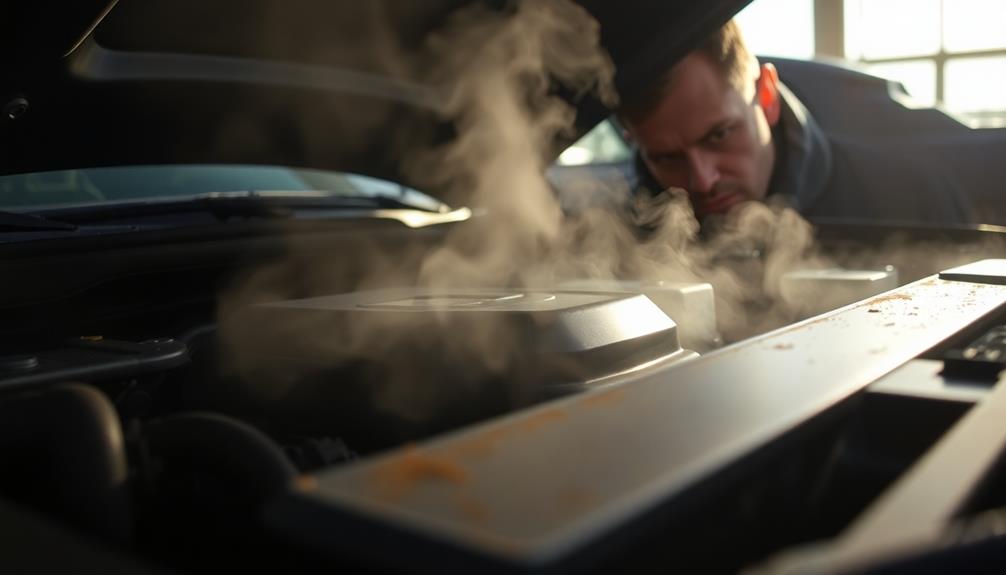
A humming engine can be more than just an annoying sound; it often signals underlying issues that need your attention. If you hear a persistent humming engine noise, it might indicate alternator problems. If left unchecked, these issues can lead to electrical failures, leaving you stranded.
Additionally, worn bearings within the engine can create a similar humming sound, signaling the need for immediate inspection to prevent further damage.
You should pay close attention to whether the humming increases with acceleration. This could suggest problems with the power steering system, potentially leading to steering difficulties.
Regular maintenance checks are essential, as they help identify and resolve humming noises early, ensuring smoother engine operation and preventing costly repairs down the line.
Ignoring a humming engine noise can result in severe mechanical failures, emphasizing the importance of timely diagnosis and repair.
Don't wait until it's too late—address the issue as soon as you notice the sound. Taking action promptly can save you both time and money, keeping your vehicle running smoothly for years to come.
Rattling Under the Car
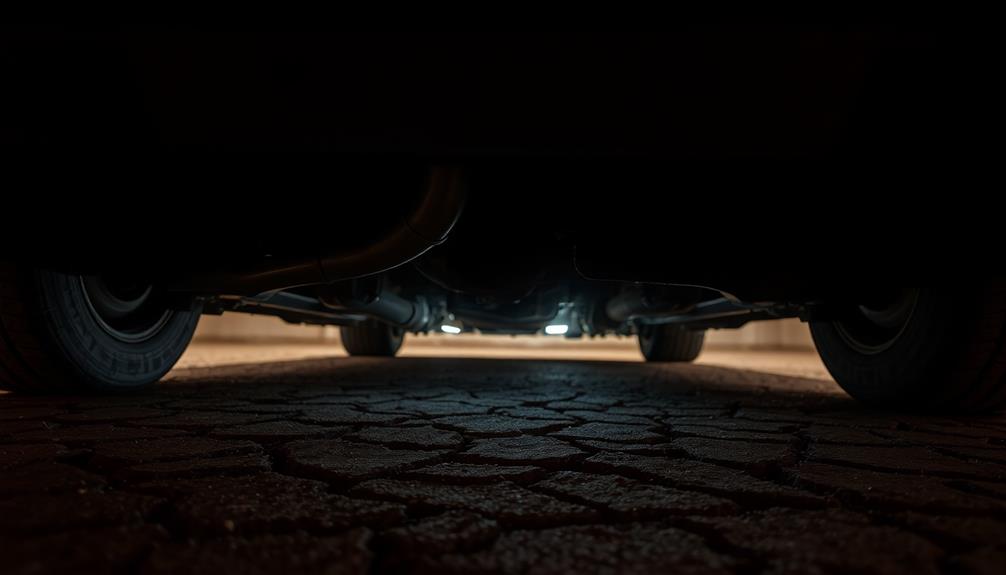
Hearing a rattling noise under your car can be alarming and often points to issues that need immediate attention. These rattling noises can stem from various sources, including loose exhaust components, worn suspension parts, and loose heat shields. Ignoring these sounds may lead to significant problems, increased repair costs, and safety hazards while driving.
To help you identify the potential causes of rattling noises, here's a quick reference table:
| Cause | Description | Consequences |
|---|---|---|
| Loose Exhaust | Exhaust components may have come undone. | Compromised vehicle performance. |
| Worn Suspension Parts | Aging or damaged parts can rattle over bumps. | Reduced ride comfort and handling. |
| Loose Heat Shields | Shields protecting components may be loose. | Risk of damage to other parts. |
Regular inspection of your undercarriage is essential to catch these issues early. By addressing rattling noises promptly, you can avoid major repairs and keep your vehicle safe and reliable. Don't wait too long—take action and make sure your car remains in top shape!
Whistling or Hissing Sounds

Rattling noises can often lead you to worry about your vehicle's health, but other sounds, like whistling or hissing, can signal different issues. If you hear these noises, it might indicate vacuum leaks in your vehicle's system, which can negatively impact engine performance and efficiency.
Hissing sounds during your drive could stem from air intake problems, such as a damaged air filter or loose connections.
Additionally, if you notice whistling noises at high speeds, it might be due to gaps in window seals or door frames, which can disrupt aerodynamics and affect fuel consumption.
Ignoring these whistling or hissing sounds isn't wise—prompt attention is essential. If left unchecked, these issues can escalate, leading to further complications and costly repairs.
To maintain your vehicle's health, regularly check the intake system and seals. This not only enhances overall vehicle performance but also helps you avoid sound-related issues.
Frequently Asked Questions
Why Is My Car Making a Whirring Noise?
If your car's making a whirring noise, it might indicate issues with components like the alternator or tires. Don't ignore it—check for wear or consult a mechanic to prevent further damage.
Why Is My Car Making a Strange Noise?
If your car's making a strange noise, it could be anything from worn brakes to loose parts. Don't ignore it; get it checked out soon to avoid costly repairs and guarantee your safety on the road.
What Noise Does a Bad Engine Make?
When your engine acts like a clunky old typewriter, it might produce knocking sounds, humming, or rattling. These noises often signal serious issues that need immediate attention to avoid costly repairs and further damage.
When Your Car Is Making a Rumbling Noise the Most Likely Cause Is What?
When your car's making a rumbling noise, it's likely due to exhaust system issues, worn suspension components, or drivetrain problems. Don't ignore it—get it checked to avoid further damage and costly repairs.
Conclusion
If your car's making any of these sounds, don't ignore them! Those seemingly innocent noises could lead to catastrophic mechanical failures that'll leave you stranded in the middle of nowhere. Getting your vehicle checked by a professional can save you from a wallet-destroying repair bill and guarantee your safety on the road. Don't wait for a minor issue to turn into an automotive nightmare—take action now and keep your ride running smoothly!

